6 Best Alternatives to Aircall
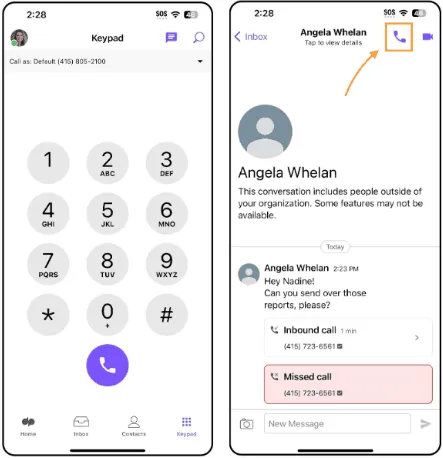
Get the work done for any meeting
Meeting transcription, AI custom notes, CRM/ATS integration, and more
ircall is popular, but it isn’t always the right fit. Maybe you need stronger AI, simpler pricing, or deeper integrations.
The good news? You have options.
In this article, you’ll explore the best Aircall alternatives.
1) Noota

Noota is an AI calling and meeting workspace. You place calls from your browser or mobile app, and Noota records, transcribes, and summarizes automatically. You get clean notes and instant follow-ups.
It also plugs into your daily stack. You can push outcomes to your CRM/ATS and productivity tools without retyping. Your process stays fast and consistent.
Core features you’ll use
- Call anywhere. Click any number on the web and dial with Noota; it detects numbers on pages and launches the call.
- Record + transcribe in real time. Every call is captured with instant text and a summary when you hang up.
- Instant summaries and action items. You finish the call with decisions, tasks, and a recap ready to share.
- Email follow-ups from notes. Turn conversations into ready-to-send emails and reports.
- Integrations that stick. Sync to Salesforce, HubSpot, Bullhorn, Notion, Slack, and more; connect to Meet/Zoom/Teams/Webex too.
- Chrome extension. Start/record meetings in one click and “click-to-call” from any website.
Why you’ll like it (pros)
You work faster because calls, transcripts, and summaries live in one place. You don’t switch tools or retype notes. Your follow-ups land minutes after the conversation.
Your systems stay updated. Noota pushes insights to your CRM/ATS so pipelines and candidate records don’t go stale. You keep a reliable history of every touch.
What to watch (cons)
Noota’s VoIP stack is newer than legacy telephony suites. If you need deep carrier controls or complex telecom routing, you may still rely on your existing provider for numbers and policies. Test your edge cases first.
Advanced contact-center features (e.g., large-scale WFM) aren’t the focus. If you run a big CCaaS operation, compare against enterprise telephony. Keep Noota for AI notes and speed.
Pricing (as of today)
You can start free. The Free plan includes unlimited meetings, 300 minutes/month, mobile apps, and a VoIP call recorder. It’s a safe way to trial the workflow.
Paid tiers unlock more usage and controls. Pro is $29/user/month (monthly) or $19 on annual billing and raises minutes to 1000/month with “Ask Noota” and standard integrations. Business is $49/user/month (monthly) or $39 annually with unlimited usage, custom templates, and unlimited integrations. Enterprise adds SSO, custom DPA, and dedicated support.
Best for
- Recruiters who want call + meeting capture in one workspace.
- Sales and success teams that need instant recaps and CRM sync.
- Managers who want searchable transcripts and consistent follow-ups.
2) Dialpad Ai

Dialpad is a cloud phone system with AI built in. You get calling, messaging, and meetings on one platform. The AI transcribes in real time and adds coaching on live calls.
It’s designed for busy sales and support teams. You see summaries, keyword triggers, and guidance without leaving the app.
Core features you’ll use
- Real-time transcription on calls and meetings. No more manual notes.
- Ai Live Coach / Real-Time Assist. Pop-up cards trigger when keywords appear (pricing, competitors, objections). Reps get talking points instantly.
- Ai scorecards and QA. Faster grading and playbook adherence across many calls.
- Unified app. Calls, messages, meetings in the same place with Google/Microsoft calendar ties.
Why you’ll like it (pros)
You coach in the moment. Live Coach cards surface answers while the call is happening, so new reps ramp faster.
Your reviews get easier. Transcripts, summaries, and scorecards help you scan outcomes fast. You spend less time scrubbing recordings.
Pricing starts low for UC. You can roll out phones and basic AI without a big CCaaS commitment.
What to watch (cons)
Contact-center tiers are separate. If you need full Support/Sell suites, plan for different SKUs and higher per-seat costs.
Published prices vary by billing term. Double-check monthly vs annual before you commit.
Pricing (as of 2025)
Dialpad Connect (business phone) lists Standard from $15/user/month (annual) or $27 monthly, with higher tiers above that. Expect unlimited domestic calling, SMS/MMS, and AI transcriptions at entry.
Sales and Support bundles price separately. Recent roundups show Dialpad Sell and Support starting higher, with tiers for Essentials/Advanced/Premium. Get exact quotes for your mix.
Best for
- Teams that want live coaching and keyword-triggered guidance.
- Managers who need QA at scale with scorecards and quick reviews.
- Orgs moving to a single app for calls, messages, and meetings.
3) RingCentral
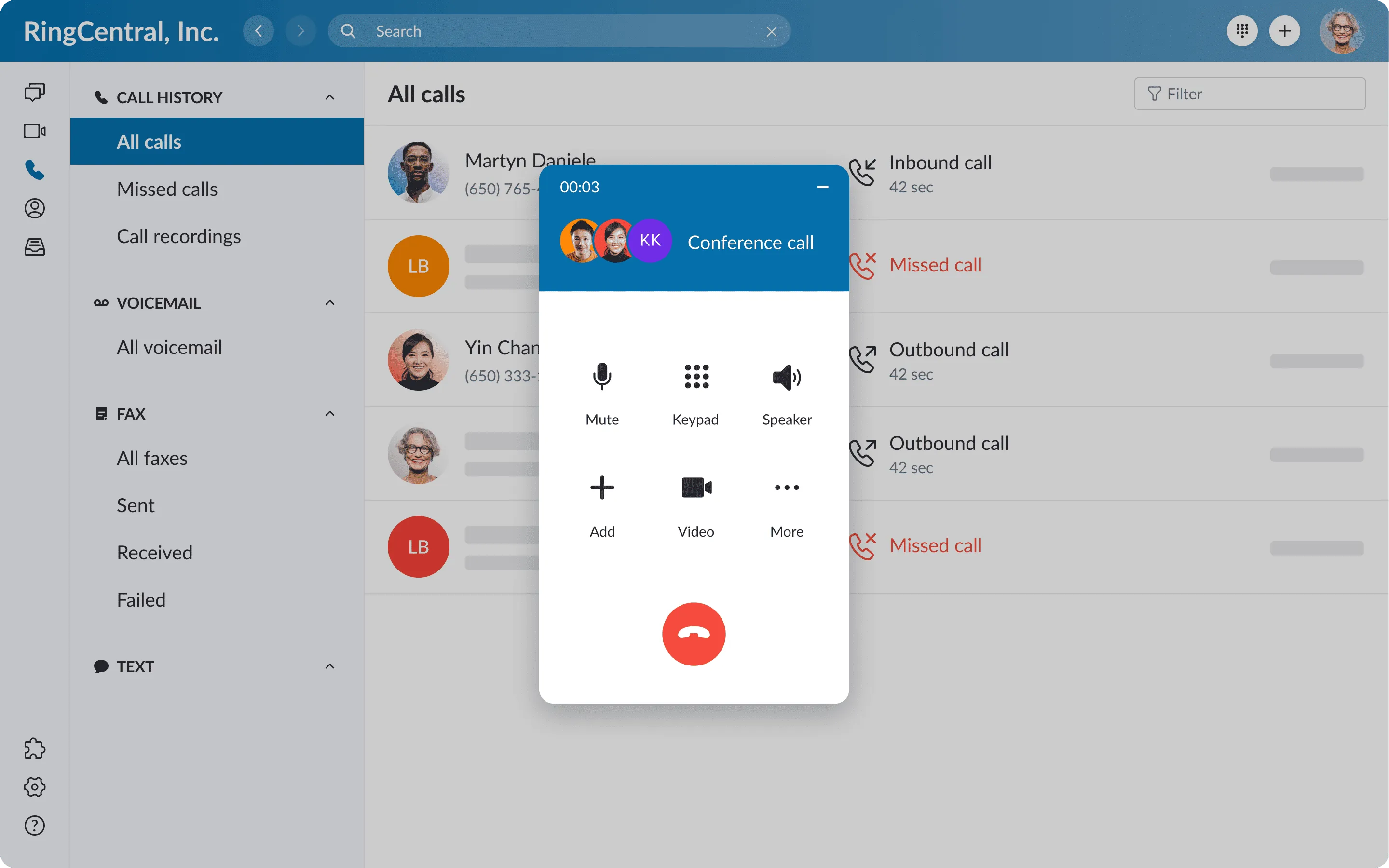
RingCentral is a unified communications platform for calls, messages, and video. Its AI Assistant transcribes, summarizes, and extracts action items from calls and meetings. You work in one app and keep a clean record of every conversation.
It also offers a contact center suite, RingCX. You get omnichannel routing plus built-in AI and optional AI WFM for staffing and forecasting. This fits larger support or sales teams.
Core features you’ll use
- Live transcription + smart notes. See words as they’re spoken and capture action items automatically. No manual note-taking.
- AI meeting summaries and highlights. Get concise recaps and chapters after calls and videos. You review faster.
- AI Receptionist / phone agent. Automate front-line calls with a voice bot that answers and routes.
- Contact center AI (RingCX). Omnichannel, AI summaries, and add-on AI WFM for forecasting and scheduling.
Why you’ll like it (pros)
You get AI on every plan of RingEX. Transcriptions, summaries, and action items are included, so you don’t juggle extra tools. That keeps your team consistent.
If you’re scaling support, RingCX brings omnichannel and workforce tools. Pricing is predictable, and you can add AI WFM when you need it.
What to watch (cons)
Pricing spans multiple products and tiers. Business phone (RingEX) is separate from RingCX, so plan your mix carefully. Annual vs monthly billing changes the effective price.
AI receptionist and contact-center features add cost and complexity. If you only need light calling, this may be more platform than you need.
Pricing (as of 2025)
RingEX business phone plans typically start around $20/user/month on annual billing, with higher tiers above that. Check the official pricing page for current promos.
RingCX lists from $65/agent/month with AI summaries and unlimited domestic minutes. AI WFM is available as an add-on following CommunityWFM’s integration.
Best for
- Teams that want AI transcription and summaries in the same app you use for calling and video.
- Companies that need an upgrade path to full contact center + WFM.
- IT leaders standardizing on one vendor for UCaaS and CCaaS.
4) CloudTalk
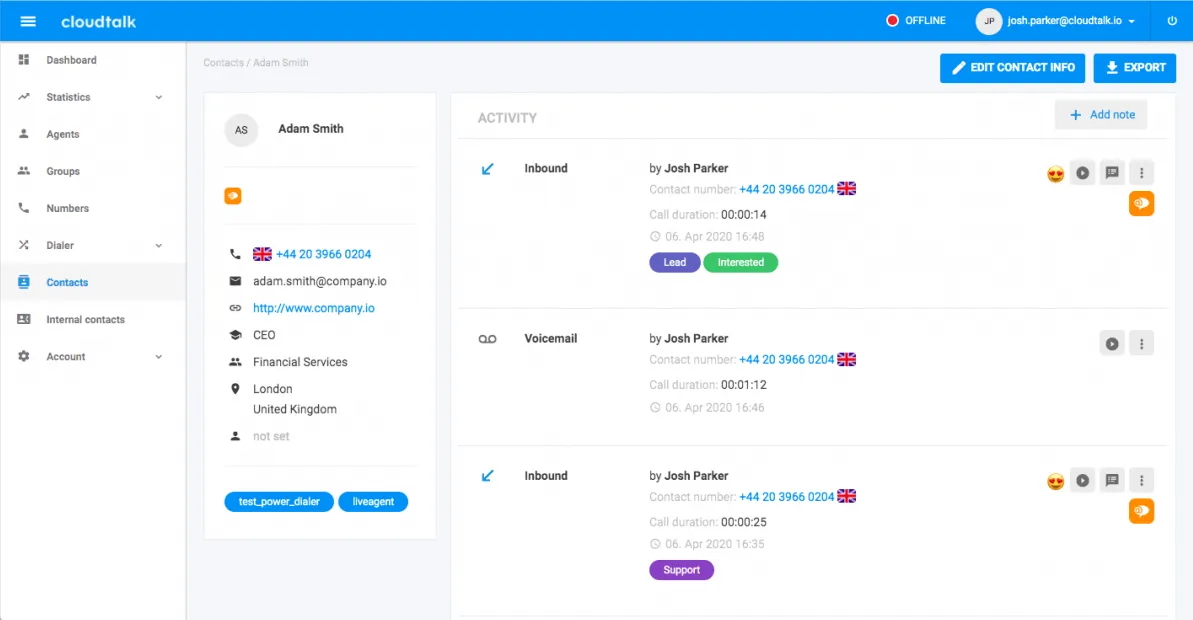
CloudTalk is a cloud phone system for sales and support teams. It adds AI on top of call recording with transcription, sentiment, and searchable transcripts. You also get flexible workflows and APIs.
It’s built for teams that want to automate post-call work. You trigger actions when a recording lands and let AI handle the heavy lifting.
Core features you’ll use
- AI call transcription. Convert recordings to text automatically with a workflow: “Recording uploaded” → Speech-to-Text → done.
- Sentiment analysis. Spot negative calls and trends without scrubbing audio.
- Transcript search. Find keywords across thousands of calls in seconds. Great for QA and coaching.
- AI voice agents (optional). Handle basic calls with a virtual agent priced by the minute.
- APIs and automations. Use workflow automations to export transcripts or trigger downstream actions.
Why you’ll like it (pros)
You keep a searchable history of every conversation. Transcripts, sentiment, and search help you coach faster. You act on data instead of hunches.
You control the workflow. Set transcription to fire only when recordings upload, then push text to your systems. It fits neatly into existing ops.
What to watch (cons)
Transcription is workflow-based, not always real-time in the dialer. If you need live coaching, confirm capabilities before rollout.
AI voice agent minutes add usage cost. Budget for per-minute pricing on top of user seats.
Pricing (as of 2025)
CloudTalk’s phone plans commonly start around $25/user/month with higher tiers at $30–$50 depending on features and analytics. Third-party trackers list ranges from $19 to $59/user; always verify current promos.
AI voice agents are usage-based. Expect roughly $0.05–$0.25 per minute depending on model and volume; CloudTalk’s own pages cite $0.25/min in comparisons. Plan your budget by expected call minutes.
Best for
- Teams that want searchable transcripts and sentiment without building from scratch.
- Ops leaders who value workflow automation after recordings upload.
- Groups testing AI voice agents for simple inbound/outbound tasks.
5) OpenPhone
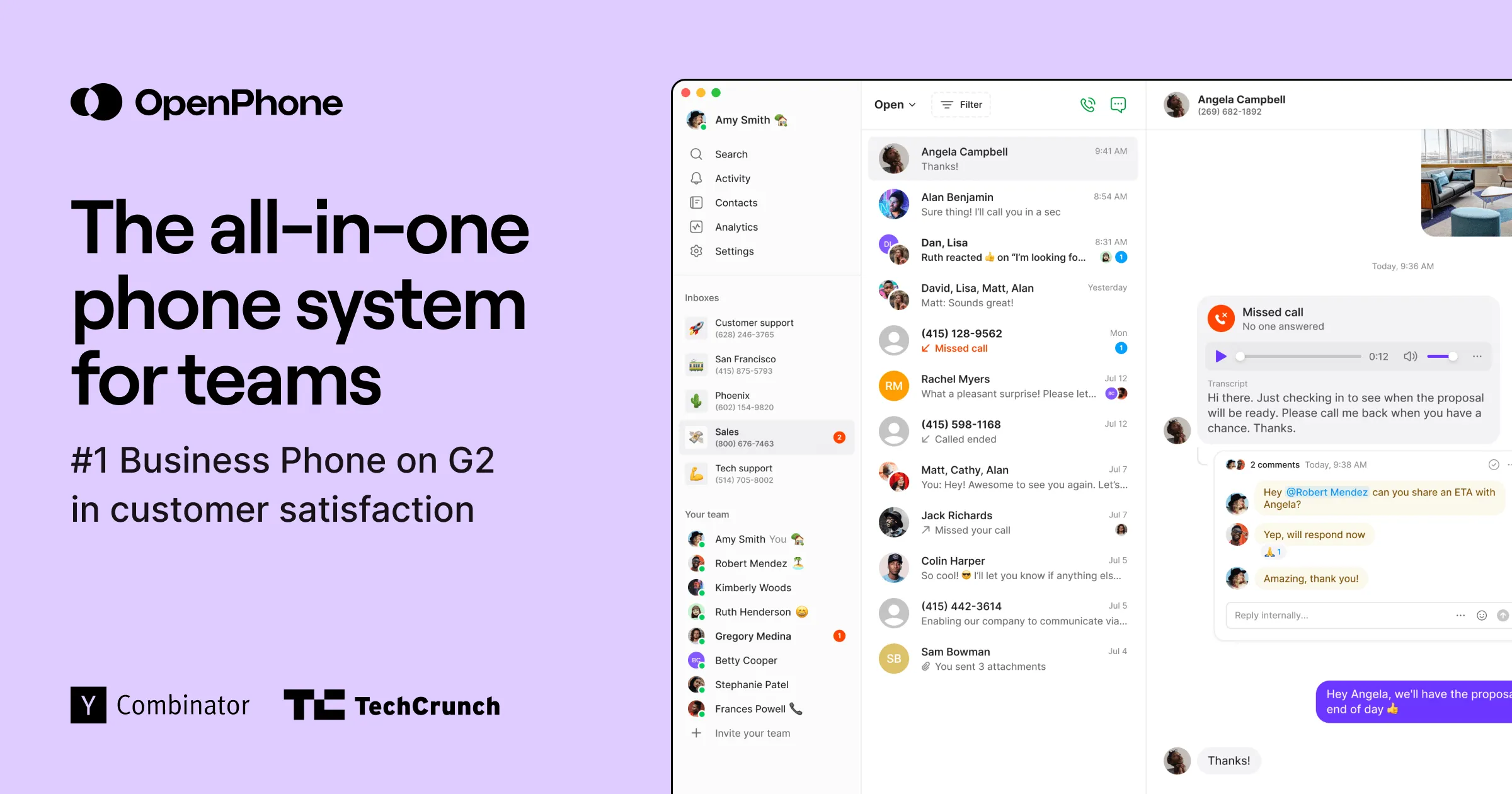
OpenPhone is a modern business phone for teams. You call, text, and share one number across teammates in a clean, AI-powered app. You work from desktop, web, or mobile.
OpenPhone adds AI where it saves you time. You get call transcripts, action-item summaries, and searchable notes after every conversation.
Core features you’ll use
- Shared numbers & inboxes. Route and handle calls/texts as a team. Everyone sees the history and can jump in.
- AI summaries + transcripts. Automatic notes with next steps and speaker-labeled transcripts.
- Business SMS/MMS. Collaborate with comments and mentions; send group texts from a shared number.
- Integrations & API. Hook into HubSpot/Salesforce (Business tier) and use the OpenPhone API.
- Voicemail transcription. Scan messages without pressing play.
Why you’ll like it (pros)
You ramp fast. The UI is simple, and shared numbers keep conversations visible to everyone. You don’t lose context when teammates rotate.
You follow up faster. AI summaries and transcripts sit under the recording, so you copy action items straight into your CRM or email.
You keep costs predictable. Pricing starts low for SMBs and includes a number per user with US/Canada calling and texting.
What to watch (cons)
Some routing features (menus, custom ring orders, advanced integrations) sit on higher tiers. Check plan details before rollout.
AI features live on Business and above. If you need transcripts/summaries on every seat, budget for that tier.
Group texting has limits on recipient count. Verify your use case fits OpenPhone’s caps.
Pricing (as of 2025)
- Starter: $15/user/month billed annually ($19 monthly). 1 number per user, calling + messaging in US/Canada.
- Business: $23/user/month billed annually ($33 monthly). Adds AI call summaries & transcripts, HubSpot/Salesforce, call transfers, and phone menus.
- Scale/Enterprise: Custom/Scale tier shown at $35–$47 with advanced controls and AI tags. Talk to sales if you need deeper admin.
- Extra numbers are $5/month each. International calling is pay-as-you-go.
Best for
- Startups and SMBs that want a shared, searchable phone system with minimal setup.
- Teams that rely on SMS/MMS and want collaboration inside the inbox.
- Managers who want AI notes without heavy contact-center tooling.
6) JustCall
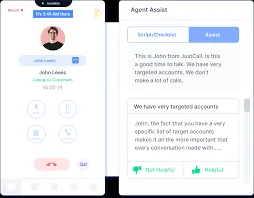
JustCall is a business phone platform with AI on top. You get voice, SMS, WhatsApp, and email in one place—plus AI for transcription, summaries, sentiment, and coaching. It also offers AI Voice Agents to answer and qualify calls 24/7.
It’s aimed at sales and support teams. You run outreach, handle inbound, and automate follow-ups from a single app.
Core features you’ll use
- AI transcription + summaries. Capture calls, get instant notes and action items.
- Real-time agent assist. Show prompts during live calls so reps say the right thing.
- Sentiment + moment analysis. Flag tough conversations and skip to key moments.
- AI Voice Agents. Answer FAQs, qualify leads, book meetings, route hot calls. 24/7.
- Dialers + workflows. Run multi-line dialing and trigger automations after calls.
Why you’ll like it (pros)
You speed up QA and coaching. Transcripts, summaries, and sentiment surface what matters without scrubbing audio.
You can cover after-hours with AI Voice Agents. You’ll qualify and schedule even when your team is offline.
Live assist helps new reps ramp. Real-time cues reduce handle time and improve consistency.
What to watch (cons)
Many AI capabilities are add-ons. Review Assist, Voice Agents, and other AI features can add per-user or per-minute costs. Budget accordingly.
Pricing and plan names have changed in 2025. Double-check current tiers (AI Communication Suite vs Sales Suite) and what each includes before you buy.
Fair usage rules may apply to “unlimited” items. If you run long calls or high volume, monitor usage to avoid surprise charges.
Pricing (as of 2025)
- Base phone tiers commonly start around $29/user/month with higher plans unlocking more features. Verify bill-monthly vs annual rates.
- AI Voice Agents: PAYG $0.99/min, Agent Lite $99/mo with 100 minutes and basic actions; higher “Agent Max” tier available. Minutes beyond included amounts are billed.
- AI add-ons: Expect add-on pricing for Review Assist and others (e.g., ~$9/user for Review Assist per recent breakdowns). Confirm with sales for your mix.
Best for
- Teams that want live guidance plus post-call insights in one platform.
- Leaders who need after-hours coverage with AI answering and qualifying.
- Orgs that leverage voice + SMS + WhatsApp in a single workspace.
Get the work done for any meeting
Meeting transcription, AI custom notes, CRM/ATS integration, and more
Related articles

Forget note-taking and
try Noota now
FAQ
In the first case, you can directly activate recording as soon as you join a videoconference.
In the second case, you can add a bot to your videoconference, which will record everything.
Noota also enables you to translate your files into over 30 languages.

.svg)
.svg)

.webp)
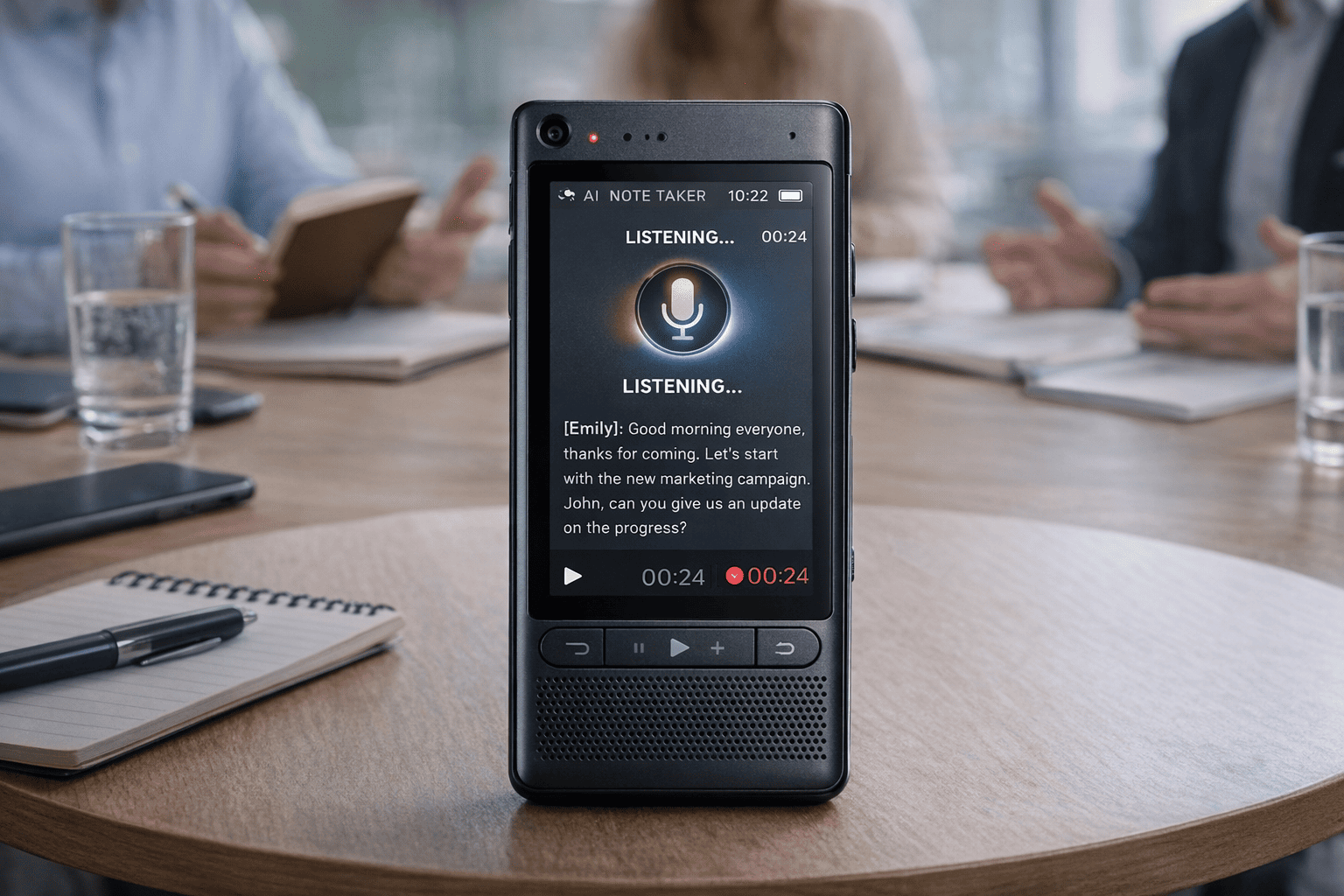
.png)
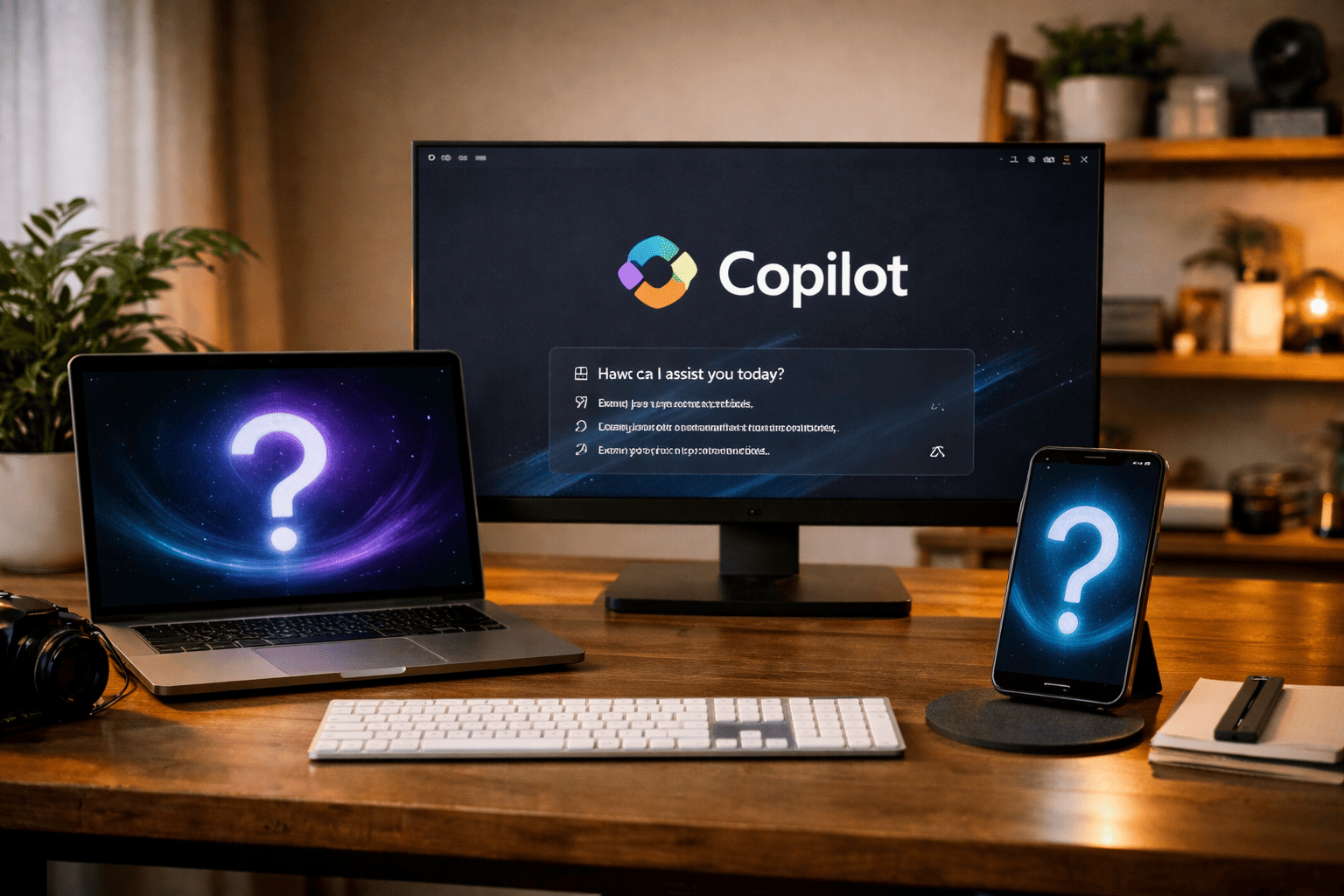

.svg)
